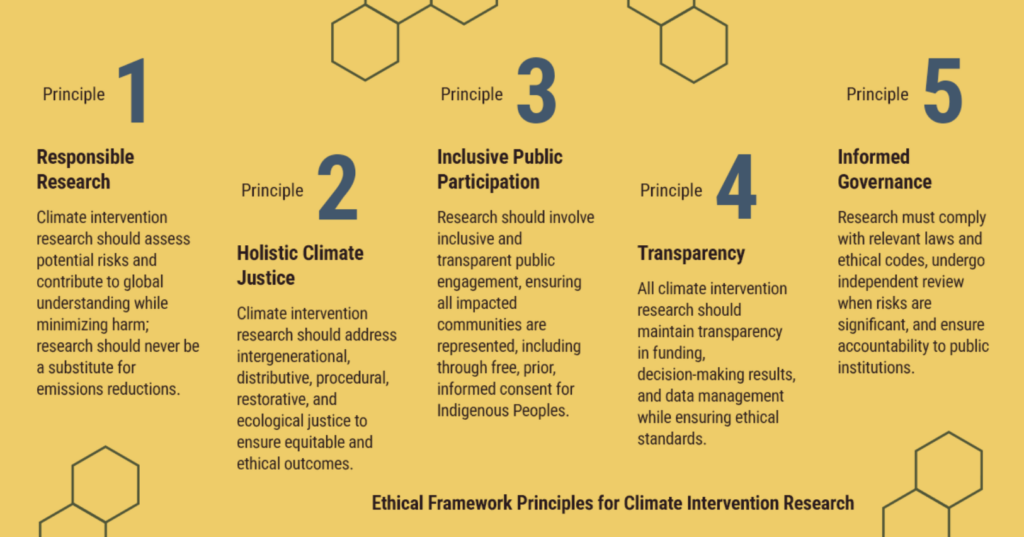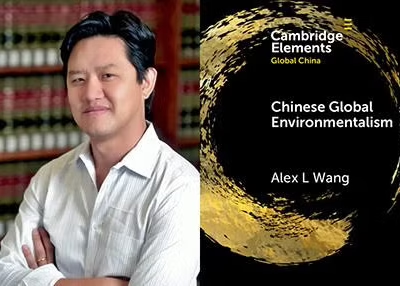An Ethical Framework for Climate Intervention Research
Can the AGU’s new principles defuse controversy and enable responsible research?
Research into climate intervention techniques, especially solar geoengineering, has long been controversial. Scientists as well as publics and policy makers have been divided on its risks and merits. In recent years, experiments proposed or undertaken in the USA, Sweden and Mexico have triggered vociferous opposition. Growing and unregulated commercial interest in the technologies seems likely to further polarize debate.
In this context a new initiative by the AGU to promote an ethical framework for climate intervention research is significant. Over the past two years the AGU has facilitated discussion on this topic amongst stakeholders around the world, an advisory board, and an invited group of contributing authors. [Full disclosure: I served as part of that last group]. The AGU’s aim was to establish a broadly shared platform of principles for responsible and ethical research that could be applied by researchers, funders and policy-makers.
The Ethical Framework
The framework published this week sets out five principles. First, responsible research, addressing risks as well as potential benefits, and guarding against mitigation deterrence. Second, climate justice, ensuring that research embeds social science and ethics expertise as well as technical and physical science. Third, public participation, involving all potentially affected stakeholders and communities. Fourth, transparency in funding, data availability and publication of results. And fifth, ethical governance and oversight, incorporating independent review and public accountability.

This topic is not simple. There are many reasonable people who would simply reject pursuing geoengineering techniques as too risky. Even research commitments could disrupt already shaky negotiations to accelerate emissions reductions and phase out fossil fuels. There are also reasonable people already convinced that the present and predictable harms from climate change justify urgently investigating geoengineering options alongside pushing for faster emissions cuts.
Avoiding mitigation deterrence
In this context, the critical question is whether such research and investigation can be done without imposing additional risks of delay to emissions cuts (mitigation deterrence). The AGU framework puts this challenge front and center. And it recognizes that all forms of research can involve similar social and political risks, not just those involving outdoor experimentation. This is an important step forward. The previously dominant view (eg here) prioritized the biophysical risks of experiments and research. But it tended to overlook the significance of political risks in earlier research steps such as modelling and laboratory work.
Promoting climate justice
This new framework also breaks with much past work in this area in being explicit that climate justice must shape research objectives and decisions. Not only does it set out a series of justice principles, it also calls for the involvement of ethicists. Some geoengineering researchers have tried to justify their work through appeals to the needs of future generations or vulnerable populations while failing to respect other aspects of climate justice. So this recommendation is particularly valuable.
Opportunities and risks
In other respects this ethical framework is less novel but still useful. It builds on and borrows from previous efforts at stimulating responsible and ethical standards for research on geoengineering and other emerging, high-risk and controversial technologies. These foundations include guidance for responsible research and innovation, the Tollgate Principles for geoengineering governance, and a proposed Code of Conduct for geoengineering research. Here, the broad participation in the AGU process will hopefully add weight and authority to these previous calls.
However there are also risks in such a process. Geoengineering techniques such as stratospheric aerosol injection and ocean fertilization only merit any consideration because the climate system is in crisis. Such high risk interventions and technologies should remain exceptional measures, requiring exceptional governance and oversight. But a framework like this could contribute to normalizing such interventions, enabling policy-makers to integrate them in climate policy in ways that seem to justify slower or less stringent emissions cuts, or reductions in climate finance to vulnerable countries and communities. In turn that would exacerbate injustice, increase harms to the environment and health, and elevate the risks of catastrophic outcomes.
Exceptional governance measures
It it therefore entirely correct that the framework calls for exceptional research governance measures – echoing those imposed on medical interventions or weapons research. Notably, the framework states that where “climate intervention technologies have significant risks, including potential transboundary impacts, funders should require plans and proposals for such research to be reviewed and approved by an independent body before commencement…. Activities involving prima facie higher risks or larger scales should be subject to progressively more detailed scrutiny.”
In other words, the default expectation should be that all climate engineering research proposals are subject to independent ethical review by an IRB or similar. Universities and other institutions developing such procedures might sensibly treat this as a precedent for other high risk technology research.
Refocusing research
If these principles are widely adopted it could defuse much of the polarization around geoengineering research. That’s because the framework could help avoid mitigation deterrence effects. And it should help refocus research towards understanding the multifaceted risks and ethical dangers of geoengineering, rather than devising ever less plausible idealized scenarios for speculative future deployment.
Rolling out the framework
An early test for the value of this framework will come as the UK delivers two new funding calls on solar geoengineering. One on modelling research and one for field experiments.
ARIA is promising to impose some ethical oversight on field experiments through a new committee, and to embed ethical and social science expertise in funded experiments. But the modalities of such processes remain unclear. As well as funding more modelling, NERC is also commissioning a parallel large scale public deliberation exercise. But it would seem to be relying mainly on normal (inadequate) university research governance processes for the funded projects.
Ensuring uptake of the framework in the private sector will be even harder. For companies such as Make Sunsets and Stardust Solutions, accountability to investors or customers comes before transparency, participation or research ethics. Stardust Solutions may have commissioned a report on governance implications, but remain opaque regarding their intentions.
Where next
The AGU plan to promote this framework widely to researchers, funders, policy-makers and more. The challenges noted above suggest that to ensure broad application of ethical standards will likely need a multilateral intergovernmental agreement, which could build on this framework. But even governance for geoengineering research is controversial. Winning international support for such an agreement would seem to require first agreeing a moratorium on deployment – regarding solar geoengineering (at least), as supported by most countries at the UNEA talks earlier this year.
Nonetheless, even if funders and researchers fail to apply these principles voluntarily, this framework offers a valuable consolidation of guidance for responsible and ethical research. And it provides an additional lever for climate activists to push for multilateral governance and help keep the focus of climate action on rapid and fair emissions cuts.







Reader Comments